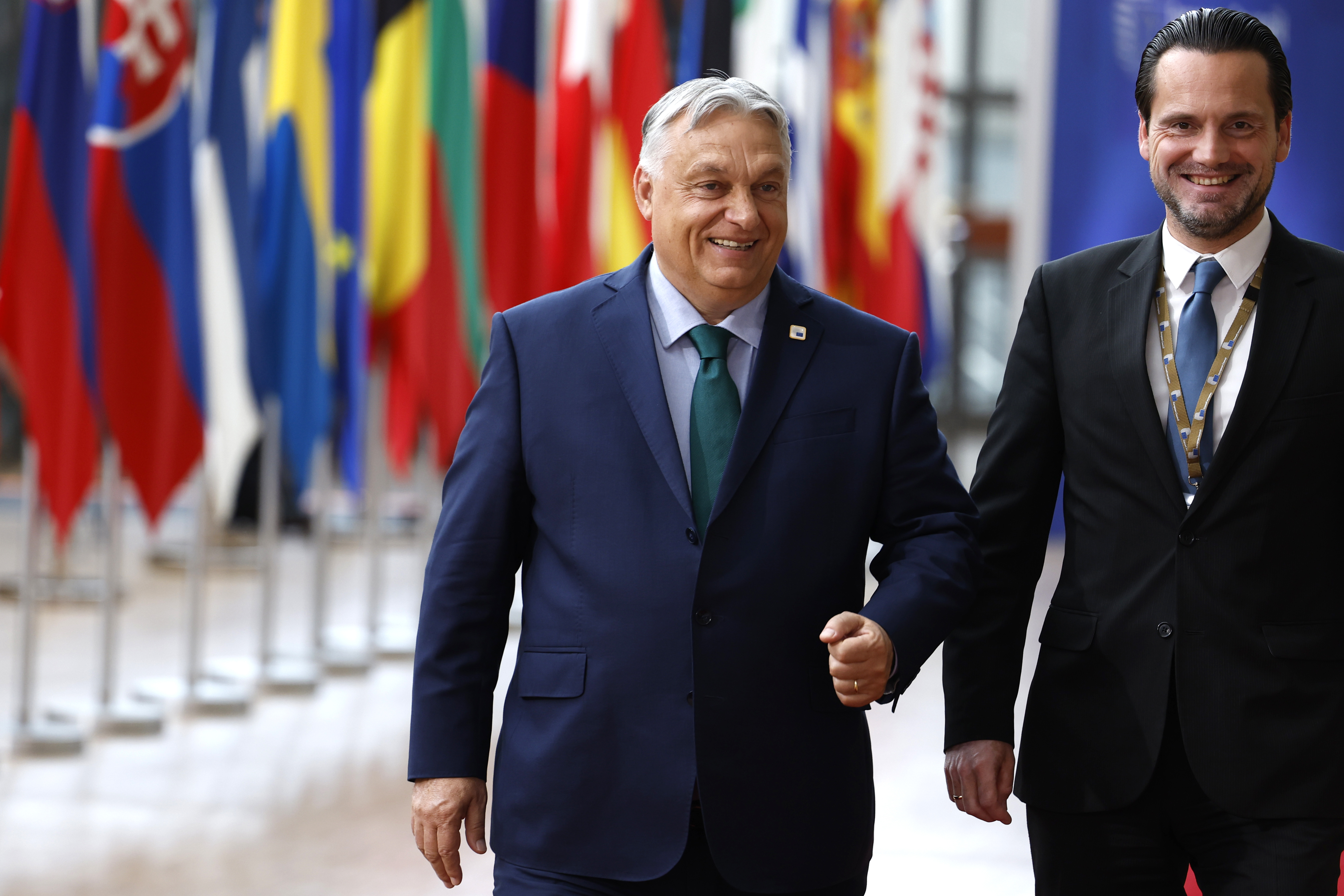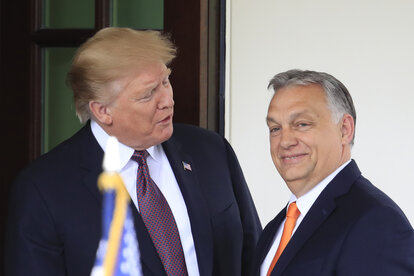European Council Presidency
Hungary takes over the European Council Presidency from Belgium

Hungary will take over the Presidency of the Council of the European Union for the next six months. Hungarian Prime Minister Orban is known for his anti-EU stance.
© picture alliance / ASSOCIATED PRESS | Geert Vanden WijngaertOn Monday 1 July, Belgium will hand over the European Council Presidency to Hungary. At a time of transition in Europe, the periodic rotation of the Presidency will also mark a changeover itself. The Presidency will move from a country at the heart of the European project, which is the first EU Member State to preside over the Council for the 13th time, to a government that has earned a reputation as Europe’s enfant terrible in recent years. How has the Belgian Presidency performed? What will be prioritised by Hungary? And what can we expect from the transition?
The Belgium Council Presidency started in turbulent times, with Russia’s war of aggression still ongoing, a renewed conflict in the Middle East and the 2024 super-election year about to start. Most notable among these elections were the European Parliament elections from 6-9 June. This meant that the Presidency‘s legislative agenda had to be wrapped up in the first months of the year, as the European Parliament moved into campaign mode in the months leading up to the elections. As a result, the Presidency sought to finalise as many legislative files as possible in the first half of its Presidency and focussed on more future-oriented work in the second half.
Generally seen as an honest broker, Belgium showed its ability to find compromises by unblocking several bottlenecks on a tight schedule. Under the slogan “Protect, Strengthen, Prepare“, the Belgian Presidency prepared a work plan that focussed on the Rule of Law, competitiveness, green transition, the social and health agenda, migration, and Europe’s global role. On top of that, Russia’s war on Ukraine could be seen as an overarching theme that touched on almost all policy areas.
Legislative push
As part of its legislative push, the Belgian Presidency concluded several important initiatives that it took over from the Swedish Presidency in the second half of 2023. These included pioneering dossiers that promote Europe’s competitiveness in net-zero technologies, such as the Critical Raw Material Act (CRMA) and the Net-Zero Industry Act (NZIA). In terms of environmental policy, these results were complemented by a surprise agreement on the Nature Restoration Regulation. This regulation, which aims to restore land and sea areas by 2030, was unlocked in the dying seconds of the Presidency, as Austria’s environment minister, Leonore Gewessler, tipped the scales on 17 June. Further important results of the Belgian Presidency were reforms of budget rules implemented for member states, the completion of the immigration and asylum pact, measures to protect digital platform workers, a revision of Schengen codes, and artificial intelligence legislation.
Support for Ukraine
The most politically charged files of Belgium’s Presidency, particularly in relation to the upcoming Hungarian one, were those on the EU’s support for Ukraine. This started in early February, when Member States agreed on a €50-billion support package for Ukraine, after Hungary’s Prime Minister, Victor Orbán, was persuaded to drop his veto. The issue came back into focus in the last week of Belgium’s Presidency, after the Hungarian government blocked reimbursements for military support to Ukraine for almost a year. This created a backlog of nearly €6.6 billion under the European Peace Facility, an instrument that is used to finance defence equipment for Ukraine. In their final meeting during the Belgian Presidency, EU Foreign Ministers on 24 June at last found a legal way to bypass the Hungarian veto. Before handing over the baton, they agreed on the use of interests on frozen Russian assets to fund EU military support for Ukraine.
With that, the Belgian Presidency concluded a challenging, but effective Presidency. It managed to close several priority files and cleared the way for the Hungarian Presidency, which will get to start a fresh legislative period.

Hungary's Prime Minister Viktor Orban, left, speaks with Ukraine's President.
© picture alliance / ASSOCIATED PRESS | Omar HavanaHungary taking over
„Make Europe Great Again“. This has been announced just a few days ago as the official slogan of Hungarian presidency. This inspiration by the signature Trump motto comes as no surprise, given the close relationship and the mutual admiration of Hungarian nationalist populist Prime Minister Viktor Orbán and US presidential candidate holding the same values.

Then-U.S. President Donald Trump welcomes Hungarian Prime Minister Viktor Orban to the White House in Washington, Monday, May 13, 2019.
© picture alliance / ASSOCIATED PRESS | Manuel Balce CenetaThe Hungarian Minister for EU Affairs explained it as a reference to an active presidency, which would manifest that, according to his words: „together we are stroinger than individually but we should be allowed to remain who we are while working together“. Moreover, during the European elections campaign, Orbán’s main campaign slogan was ‚Let’s occupy Brussels‘ – meaning, let’s transform the EU and center its agenda around conservativism, nation-state and anti-green policies.
For Orbán’s governing party, Fidesz, it has not been easy times. Even though they have been holding the reigns tightly for almost 15 years now, their position is not as unshakeable as it would seem. A new visible and charismatic opponent has emerged early this year, after the outbreak of numerous crucial political scandals. Peter Magyar, an ex-Fidesz insider, has taken over the leadership of a previously unknown party Tisza, and led it to the EU elections, where they gained incredible seven seats, and second place just after Fidesz, who gained 11 seats with about 44 % of the vote, making it the worst result in their history. The party’s popularity has been shaken by numerous huge protests taking place over the last five months, where people gathered to show their discontent with current authocratic rule underlined by corruption scandals. Furthermore, municipal elections held on the same day in Hungary as the European ones, also showed a slightly weakening position of Fidesz, with a coalition of liberal party Momentum and their partners winning over the city of Gyor from them. The capital city of Budapest remained a liberal island in Hungary, when after a very tight battle, Gergely Karácsony of a liberal-left Dialogue party defended his successful mandate as a Lord Mayor.
Despite Orbán’s anti-EU propaganda, showing ‘Brussels’ as some external threat, the Hungarian society is mostly pro-European. According to researchers from Republikon Institute, most Hungarians see the EU membership as advantageous but it is a bit complicated – data are showing that 20% of Hungarians do not support EU membership but they consider it beneficial. On a positive note, in 2021, Republikon asked 5000 Hungarians and over 75% responded that if there was a referendum about EU membership, they would vote to stay.
Hungary is taking over the Council of the EU presidency from Belgium on July 1st, for the upcoming six months. The country’s presidency is happening in a period of transition and during a super-election year with many ongoing changes, with the new European Parliament getting established in its new form and also awaiting the new Commission.There have been quite a few concerns about the capacity of Hungary taking over the Council’s presidency, because of its government’s continuous non-compliance with EU law and directives, and the overall state of the rule of law in the country – e.g. the policies discriminating LGBTQ+ community, environmental issues, or protection of rights of immigrants and asylum seekers. The latter being most recently the subject of Hungary’s fine of 200 million Euros issued by the European Court of Justice – for being non-compliant with the EU asylum law while already being reminded to modify the actions back in 2020. Additionally, Hungary receives a fine of 1 million Euros daily until it complies.[1] However, despite these concerns evoked mainly in the European Parliament during the past months and years, Hungary has still been given this opportunity, as well as responsibility to ensure a smooth transition while the new EP is being established. Therefore, it is also expected that most of the time during Hungarian presidency, there will be a focus on a distribution of roles and functions, and little amount of new legislation will be carried out.
Hungary will focus on seven key priorities, in particular enhancing EU competitiveness, strengthening defence cooperation, managing migration, and supporting EU enlargement, as announced last week by János Bóka. The minister also explained that Hungary aims to introduce a new ‘farmer-oriented’ agricultural deal, ensure “more efficient protection of external borders” and manage root causes of migration. [2]Concerning the Hungarian support of EU enlargement, this means an enlargement towards the Western Balkans, not towards Ukraine. According to researchers from Hungarian independent think-tank Republikon Institute, it is a strategic move as Orbán’s government hope to gain some allies this way (they recently lost Poland as an ally). [3]
The strategy of Hungarian presidency is therefore quite clear, however it is unsure for now to what extent active and influential is it going to be as it is a period of changes and transitions. With some new allies appearing after the latest EP elections, Orbán could be much more confident in his activities and pursues. The indicated priorities also enlighten the direction of the upcoming six months, with the general switch of topics inclining to industry, agriculture and security. However, the EU is still blocking funds for Hungary over long-term rule of law infringements, and Orbán’s government is known to be blocking important decisions, mainly regarding crucial military and humanitarian aid for Ukraine, in the recent months. The concerns are also surrounding the influence of Hungarian presidency on EU’s climate policies, particularly the setting of 2030 targets leading to the EU overall goal of net zero emissions by 2050, as Orbán’s government has been holding a negative stance towards these policies. Nevertheless, the influence of the rotating presidencies should not be overstated, as European Parliament and European Commission mainly take the decisions, and Orbán’s government is well aware that member states can always step in if needed.
[1] https://www.dw.com/en/hungary-fined-200-million-by-ecj-for-breaking-asy…
[2] https://hungarian-presidency.consilium.europa.eu/media/32nhoe0p/program…
[3] https://www.freiheit.org/european-union/hungary-europe-europe-hungary-ahead-hungarian-euco-presidency

